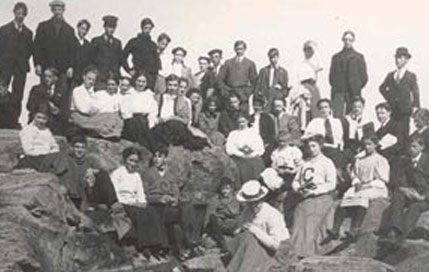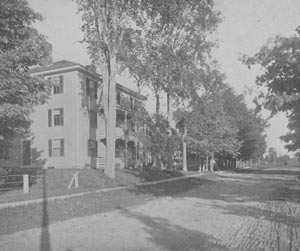Currents: past as prologue

|
|
|
The Summit of Mt. Kearsarge, Mountain Day, Colby Academy, ca. 1900. |
The Hills of New London: Four Views from the 1890s
“The Mountain Scenery of New London”
William P. Houston, Colby Academy Voice, April 1898
From the exacting duties of a busy professional life and the sometimes uncongenial surroundings of a great city, I often look back with joy to the days spent among the hills of New London, amid the scenes of perennial beauty. In my school days I learned to love the place, and in vacation seasons of after life, with spirit becalmed and tranquil, I have there found days of rest and contact with nature, and stored up strength and sunshine for another year of labor; and the memory of those highland scenes has lightened the work of many an otherwise tedious hour. Those days seem to me now the flower and adornment of the passing years, wherein I had revealed to me anew something of the 'divine significance of life.' Born and reared in New Hampshire, I love her mountains with a tender passion; in some mysterious, but not the less real, way I am related to them; and I know they have left their impress and influence forever upon the soul and fibre of my being.
I consider it a singularly beautiful compensation of nature that, while New London has no mountains of its own, the town should be so rich in mountain scenery, being on this account unique and very charming… I always return to New London with a new sense of gladness to be there, and find some features of its scenery that are unsurpassed in all the mountain region… [From the campus on New London Hill] can be seen some seventeen mountains, varying in distance from six or seven to seventy miles, and all to be had without ascending a mountain or even climbing a high hill.
“The Death of Winter”
Colby Academy Voice, March 1899
Old Father Winter, with his snowy locks, lies dying. His face is roughened and withered by the storms of his ninety days; his sight is bedimmed by the strain of constant use; and his limbs are crippled and weakened from exposure. Yet there is a certain radiance in the aged face, and a gleam of hope in the fading sight, for his life has had its share of sunshine and joy, and he has run his long course faithfully and well.
“A Fresh Breeze from the New London Hills”
Alice F. Sargent '99, Colby Academy Voice, October 1898
At this point the whole valley lay spread out before us. The delicate and varying green of the young foliage mingling with the pure white of many blossoming trees and plants, dead trees whose naked branches and gnarled trunks rose above the young growth, somber relics of the virgin forest and jagged boulders rising gray and forbidding, all combined to make a picture grandly beautiful and far beyond my powers of description.

|
|
|
Street scene, New London, NH, ca. 1898. Looking up Main Street towards the Colby Academy campus. On the left is the Hotel Sargent, now the New London Inn. |
“New London in 1930”
Jennie Prescott '00, Colby Academy Voice, May 1899
My Dear Friend:--- After many years, I am again in New London, where I once attended school, and with which so many associations are connected, but New London then and New London now are quite different, and many changes may be noticed…
The streets and most of the buildings are lighted by electricity. I also notice the car tracks upon the street, and soon I see a car coming, and wonder what the force is that propels it, as I am unable to see either trolley or wire. I speak to Mr. Mack Kidder, an old resident, and ask him concerning it.
“Those cars,” says he, “are run by magnetism--- magnets are placed at intervals along the track, and there is one on the car, also; the polarity of the magnet on the car can be reversed, and by the power of attraction or repulsion the car is propelled.”
…I go to Mr. Robert Shepard's stable to get a carriage, and what is my surprise to find that now no horses are kept, horseless carriages only being used. This I thought a much-needed improvement, as I well remembered the New London hills, for which I think horses would have little fondness…
On passing Professor Will Clough's farm, I notice that the rain is falling heavily upon a vegetable garden, while upon everything else the sun is shining. I think it some strange phenomenon, and so go to the garden to witness it. I there discover that the rain is produced by a rain-making machine which he had invented, and he explains it to my satisfaction.
On arriving at Lakeside, I notice a strange looking machine, which Deacon John Prescott standing near by informs me is a flying-machine to take the guests to points of interest, such as Kearsarge mountain, Corbin's park, etc.
He, noticing my curiosity, invites me to step in and he will take me for a trip; taking his position at the pilot house, he presses a button, and away we go into the air; swooping over 'Hominy Pot' and North Sutton, we take a bee-line for Kearsarge, on whose summit, in the short space of fifteen minutes, we arrive.
We stay a few moments, and then begin our homeward flight, passing over 'Shindagan,' Pleasant lake, Royal Arch, and Otterville, arriving at Lakeside in time for dinner.
I then take my horseless carriage back to New London hill, leave it at the stable, and return to the academy, well pleased with my day's sight-seeing, and the progress of New London.
Questions or comments on this story? Click here to send us an e-mail.


